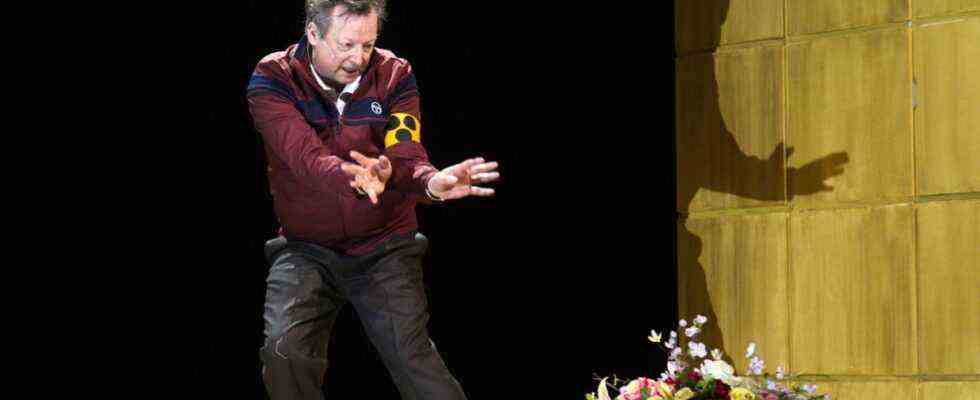Of course that doesn’t work at all, not in times of wokeness, feminism and criticism of representation: A middle-aged man from the upper middle class who is only interested in himself for a whole novel or for the duration of an evening at the theatre. The rest of the world, his lover, “the women” in general serve primarily as a mirror of one’s own self-fascinated person. On the other hand, of course, that works very well, at least if you don’t confuse novels with editorials and pamphlets and don’t primarily demand demonstrations of sentiment from theater performances. This clears the view, for example for the intrinsic truth of a work of art and the contradictions and ambivalences of its figures.
The actor Matthias Brandt and his director Oliver Reese now succeed in fathoming precisely these ambivalences at the Berliner Ensemble with a furious, nuanced exploration of Max Frisch’s identity question mark novel “Mein Name sei Gantenbein”. The solo evening for a highly concentrated Matthias Brandt, who is acting here for the first time in two decades, is nothing less than the rediscovery and rediscovery of the novel that was published almost 60 years ago. This 300-page long, dense self-interrogation of an aging first-person narrator, who plays through the missed opportunities of his own life in many variations, a single what-if with the recurring mantra “I imagine …” is natural also exploring a crisis area of crumbling masculinity.
What we think of as identity is little more than a grand assertion
Brandt bestows this first-person narrator with a seductive nonchalance, sometimes with a Jean-Gabin stoicism that nothing can shake, with a thoroughly melancholic self-mockery that shimmers through again and again. But because none of his roles really matter, whether as a husband or a lover, as a man of the world or as a citizen of Zurich, he can only play with these roles. When all certainty eludes him, whatever he thinks his life is right now is just one of countless possibilities. Niklas Luhmann invented the beautiful expression of the “expectation collage” for the person who is confronted with the most diverse perceptions and demands from the outside world: What we consider our identity is not much more than one of loosely connected, changing social roll compound statement.
This radicalizes Frisch’s first-person narrator when he constantly reinvents himself, for example as Gantenbein, who tries to play blind in order to be able to better observe the others. What if Gantenbein’s lover was unfaithful, or if she wasn’t a famous actress but, for example, a scientist? And why should one variant be more likely, even more real, than another? Social life slips into the subjunctive and becomes a theatrical play, bordering on the farce of eternal role changes: how could the others see me? And could I be a completely different person in her eyes? And is what I claim to be my person only an invention of very limited durability? Because the novel is one meandering soliloquy, a glimpse into countless broken reflections, Reese’s decision not to stage it as an ensemble piece but as a monologue for Matthias Brandt makes perfect sense.
Matthias Brandt plays free from sweaty testosterone self-torment self-importance
That’s all it takes for a fascinating evening at the theatre: a good actor, a literary work that asks a few fundamental questions, and a director who listens carefully. Well, monologue isn’t quite the right genre description, Brandt doesn’t pronounce himself as an unmistakable self. On the contrary, he’s trying out different versions of himself: “I try on stories like clothes,” is one of the key phrases of the evening. It is logical that this can be used for theater jokes when these role dresses do not always fit perfectly and, for example, the cufflinks on Gantenbein’s shirt sleeves are missing.
Matthias Brandt plays the identity changer lightly, almost like a dancer (stage: Hansjörg Hartung).
(Photo: Matthias Horn)
Matthias Brandt, so to speak the paradox of an introverted actor, whom one believes to be watching while playing, while listening to oneself, plays these experimental changes of characters very lightly, sometimes almost like dancing, always with a little astonished amazement, as if he could do it only take everything seriously to a limited extent: Oh, so I could be that too, amazing. This is free from sweaty testosterone self-torment self-importance and, for all the seriousness of every new opportunity and role exploration, always has something of the unsentimental ease with which Brandt shakes off the suit jacket or blind glasses that are no longer needed and lets them fall off the stage, ready for that the next thought experiment with one’s own self.
Of course, the staging also makes fun of some of Frisch’s remarkably robust gender clichés, in which men like to think and fill their pipes, and women are above all flighty and enigmatic, but have “sensual” lips. In Brandt’s case, Frisch’s cool masculinity sometimes becomes an erotically insatiable joke figure, for example when he wriggles on the sickbed, in the face of approaching death he can only think of “laps”, namely “all laps”. Big fun. Despite its abyss, the identity game can become very funny, for example when his jealous Gantenbein secretly and increasingly outraged reads the love letters that his lover hides in a drawer: “Ecstasy telegrams! Simply boring! Life kitsch!” Only shortly after the tantrum does he discover that these are his own love letters. Not even in the frenzy of jealousy can you rely on your own unmistakable identity.

